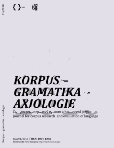Korpus - gramatika - axiologie
Corpus – grammar – axiology
Publishing House: AV ČR - Akademie věd České republiky - Ústav pro jazyk český
Subject(s): Theoretical Linguistics
Frequency: 2 issues
Print ISSN: 1804-137X
Status: Active
- 2010
- 2011
- 2012
- 2013
- 2014
- 2015
- 2016
- 2017
- 2018
- 2019
- 2020
- 2021
- 2022
- 2023
- Issue No. 1
- Issue No. 2
- Issue No. 3
- Issue No. 4
- Issue No. 5
- Issue No. 6
- Issue No. 7
- Issue No. 8
- Issue No. 10
- Issue No. 9
- Issue No. 11
- Issue No. 12
- Issue No. 13
- Issue No. 14
- Issue No. 15
- Issue No. 16
- Issue No. 17
- Issue No. 18
- Issue No. 19
- Issue No. 20
- Issue No. 21
- Issue No. 22
- Issue No. 23
- Issue No. 24
- Issue No. 25
- Issue No. 26
- Issue No. 27
- Issue No. 28
Articles list
{{ article.TitleOriginalLanguage }}
{{ article.TitleOriginalLanguage }}
({{ article.TitleEnglish }})
- Publication: {{ article.Publisher }} ({{ article.Issue }})
- Author(s): {{ article.Authors }}
- Contributor(s): {{ article.Contributors }}
- Language: {{ article.Language }}
- Subject(s): {{ article.Subjects }}
- Issue: {{ article.Issue }}
- Page Range: {{ article.PageRange }}
- No. of Pages: {{ article.NumberOfPages }}
- Keywords: {{ article.Keywords }}
- Summary/Abstract: {{ article.SummaryAbstract }}
- Price: {{ common.currency(article.Price) }}
Short Description
The linguistics journal KORPUS – GRAMATIKA – AXIOLOGIE is a scientific
linguistic periodical which is considered to be neither narrowly specialized nor polythematic.
The journal is exclusively orientated toward the following research domains:
1) corpus-based research into Czech and other languages, with emphasis on
their grammatical structure, evaluation of linguistic forms, visà- vis textual
distribution, empirically grounded theories of the relationship between
,langue’ and ,parole’.
2) axiological aspects, in case of which submissions in the following areas will
be particularly valued:
• general and specific aspects of stylistic registers reflecting various cultural
backgrounds and functions in social interaction;
• theory of language culture and communication;
• the development of literary Czech, archaisms and neologisms;
• issues of acceptability and functional motivation in verbal communication;
• grammaticality of morphological or syntactic structures;
• language and style of literary texts;
• typology of linguistic errors in the text production.

